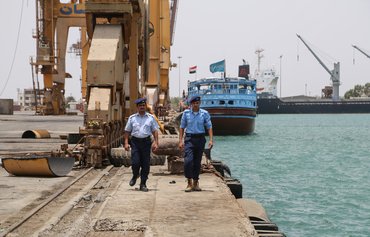Researchers and human rights activists have called on the US to take stronger measures to prevent Iran from smuggling weapons to the Houthis (Ansarallah).
"The US is making efforts to prevent Iranian weapons from reaching the Houthis, Iran's allies, but they are not at the level of US efforts in the war against al-Qaeda or the 'Islamic State of Iraq and Syria' (ISIS)," lawyer and human rights activist Abdul Rahman Barman told Al-Mashareq.
US efforts include the seizure of a number of arms shipments sent by Iran across the Red Sea, he said.
"The Houthis have become a threat to stability and peace in the region," he said, calling on the US to take further measures against Iran and its proxies.
"The ongoing conflict in Yemen is being fueled by arms provided by Iran to the Houthis, thus threatening the stability of international maritime waterways in Bab al-Mandeb", he added.
Blocking arms smuggling routes
"The US is exerting enormous efforts in the war against terrorist groups such as al-Qaeda and ISIS," Barman said, pointing out that it has entered into a "direct war" with these extremist groups.
"As for how it is dealing with the Houthis, it has in fact begun to take strong action against them," he said.
This includes blocking Iranian arms smuggling routes to the Houthis and supporting the efforts of the Arab coalition in its fight against the Houthis and ex-president Ali Abdullah Saleh to return the legitimate government to power.
Barman called on the US "to take tougher action against Iran and its proxies in Yemen, because Iran is one of the reasons for the continuation of the conflict and the primary cause of the continuing tragedy".
"Iran does not deny its role in supporting the Houthis with weapons and military expertise, in addition to its diplomatic and media support, and has admitted doing so numerous times through its military commanders and government officials," he said.
"Iran must stop its role in supporting the Houthis," he said.
Action against Iran and proxies
"The US has begun to take action against Iran and its proxies in Yemen with its active participation in monitoring the smuggling of weapons from Iran to the Houthis via land and sea routes, and its seizure of a number of shipments headed to the Houthis," said political researcher Adnan al-Humairi.
In a report issued November 30th by Conflict Armament Research (CAR), international investigators said they had found a suspected "weapon pipeline" from Iran through Somalia to Yemen.
Iranian support for the Houthis on the military and media fronts "is a major reason for the continuation of the conflict and the war", al-Humairi told Al-Mashareq.
US policy towards Iran and its allies in Yemen has begun to change in contrast to its previous stances before the Yemeni war broke out, he said, but he urged the US to take a tougher stance against Iran and the Houthis to alleviate the humanitarian crisis Yemenis are facing.
Prolonging the suffering
Al-Humairi said US measures to stop the smuggling of weapons to the Houthis "have been effective in preventing the delivery of strategic and heavy weapons".
"Medium and light weapons are likely to continue to reach the Houthis, however, due to the fact that Yemen has long coasts, vast deserts and numerous islands that make the likelihood of success in smuggling them much greater," he said.
Smugglers and some transportation workers have been helping Iran and its allies smuggle weapons to the Houthis, he said, "which has been a contributing factor to the continuation of the conflict".
Additionally, the main ports of entry -- notably al-Hodeidah -- remain under the Houthis’ control, which has ensured the uninterrupted smuggling of weapons.
This has had an impact on the flow of aid through the port of al-Hodeidah.
Humanitarian aid has not been reaching those who need it in the provinces controlled by the Houthis, Studies and Economic Media Centre chairman Mustafa Nasr told Al-Mashareq.
"It has been seen being sold in markets, while people suffer from a food crisis in those provinces, which are home to two thirds of the population," he said.
The conflict in Yemen continues, because Iranian support for the Houthis is "fueling the conflict and prolonging it, and consequently exacerbating the suffering of Yemenis", Nasr added.

![Newly recruited Houthi fighters take part in a gathering in Sanaa on January 3rd. Yemeni experts have called on the US to take tougher measures to prevent Iran from arming the group. [Mohammed Huwais/AFP]](/cnmi_am/images/2017/09/13/9549-Yemen-houthis-march-600_384.jpg)







Good.
Reply2 Comment(s)
If Arabs believe that America is capable of everything, then there is no good in neither Arabs nor Muslims!
Reply2 Comment(s)